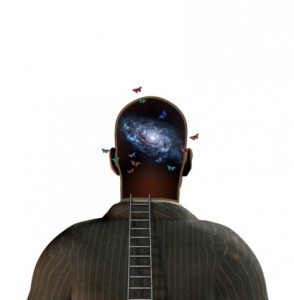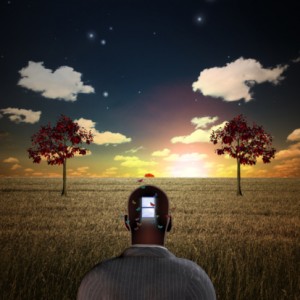The Handmaid and the Mistress
By Nir Menussi: February 18, 2011: Category Inspirations, Networks of Meaning
Integrating Science and Mysticism, Article 7
 We dedicated the previous four articles to surveying the multilayered crisis of the scientific age, the signs of which are all around us. But what now? What can we do about it?
We dedicated the previous four articles to surveying the multilayered crisis of the scientific age, the signs of which are all around us. But what now? What can we do about it?
It appears the crisis is telling us one simple thing: that while science is an incredible tool for understanding the workings of nature and even culture, and for manipulating nature in order to create technology, it is not qualified to govern our lives. It can neither tell the whole world story, nor teach us how to lead our lives. It’s the best method we have for understanding what things are made of and how they occur; it has zero to say about what they are or why they occur. It gave us unbelievable technology which has vastly improved and lengthened our lives; it cannot give us guidelines as to what we should and shouldn’t do with it.
The Handmaid of Theology
It would be helpful to put the whole thing in historical perspective. Modern science is the child of what until the 19th century was called natural philosophy, which was itself a child of plain, good old philosophy. So when Middle Age thinkers spoke of philosophy, they were speaking of the progenitor of science.
And what did Middle Age thinkers have to say about philosophy? Well, a key phrase in medieval Christian thought was that “philosophy is the handmaid of theology”. Theology was “the queen of the sciences”, containing the basic truths and tenets of faith, while philosophy provided analytical tools that assisted in learning theology. Equivalent phrases existed in both Judaism and Islam. For example, Maimonides said that the wisdoms of the nations should serve as “perfumers, cooks and bakers” for the Torah.
In light of this, a good way to describe what happened during the Renaissance and the scientific revolution was that philosophy rebelled against her theological mistress, the Catholic Church. And for good reason: as we all know, it was precisely this subservience of science to the Church that held back its development for about a millennium (excluding purely abstract sciences like mathematics). Indeed, although they don’t usually make use of this particular metaphor, this is exactly how modern historiography describes the scientific revolution: as a sort of heroic, intellectual slave rebellion story in which science broke free from the shackles of religious dogma.
“A Handmaid that is Heir to her Mistress”
Except that science didn’t only break free from its mistress, it also usurped her throne. Not in all ways but in many ways still, science—especially when taken as referring to the general culture of the enlightenment that sprang from it—became the new queen of the Western mind, the new ‘theology’ so to speak. True, science isn’t hardly as dogmatic as the Church was, doesn’t have an infallible head scientist governing it, and doesn’t burn its opponents on the pyre; but inasmuch as ‘theology’ describes the power that shapes our most fundamental worldview and values, then science is the inheritor of religion (plus, as we have seen, it does have its share of unconscious dogma, and does sometimes burn its opponents on the metaphorical pyre by mocking them on various stages).
What happens when we try to examine the contemporary crisis of science described in the previous articles in light of this context? We can now redefine it in the following way: the contemporary crisis of science is the dawning realization that, although science’s rebellion against Christianity was well justified, science doesn’t have what it takes to assume its place as the new queen of knowledge. True, it can finally do what it does freely and creatively, and has indeed been unbelievably successful in it; but it cannot provide its own metaphysical framework, nor reveal the inner meaning of its findings, nor guide us through the trials and tribulations of human existence (including the new set of dilemmas it’s own technology has posed before us). In other words, having had a bad mistress doesn’t make you into a better one; it just means you need to find a new mistress!
Mistress Wanted, No Experience Needed
Needless to say, the idea that science will once again be subjected in any way to religion is the scientist’s worst nightmare. Reluctantly accepting the fact that science is partial and limited is one thing; jumping to what appears to be the most extreme conclusion and saying it must resume its role as handmaid to religion is another thing altogether.
 And yet, we claim this conclusion inevitably follows from the current breakdown of science’s regime: science needs to be placed within a meta-scientific framework which would elevate the knowledge it gains and endow it with meaning and value. On the other hand, rest assured we also claim that this new ‘subjection’ is to assume a completely different form this time around. First of all, we are not talking about a coerced subjugation of science to religious authority, but about a voluntary integration of science into the broader context of religious wisdom.
And yet, we claim this conclusion inevitably follows from the current breakdown of science’s regime: science needs to be placed within a meta-scientific framework which would elevate the knowledge it gains and endow it with meaning and value. On the other hand, rest assured we also claim that this new ‘subjection’ is to assume a completely different form this time around. First of all, we are not talking about a coerced subjugation of science to religious authority, but about a voluntary integration of science into the broader context of religious wisdom.
Secondly, it is in the hands of a completely different religious tradition that we think science should be placed, one that is altogether more open to, and respectful of, secular thought. The tradition we have in mind is that of the Torah passed down through Judaism, in particular its esoteric branch of Kabbalah and Chasidism; and the reasons we think it will treat science very differently from Christianity will be the subject of the following articles.
http://www.interinclusion.org/inspirations/religious-tolerance-to-science-a-comparison/
The Handmaid and the Mistress,























;)
;)
;)
;)
;)
;)
;)
;)
;)
;)

great article! looking forward to its followup